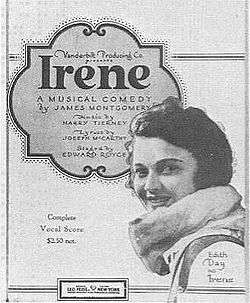Edith Day

Edith Day (April 10, 1896 – May 1, 1971) was an American actress and singer best known for her roles in Edwardian musical comedies and operettas, first on Broadway and then in London's West End.
Life and career
Born in Minneapolis, Minnesota, Day made her Broadway debut in Pom-pom in 1916, then Follow Me the same year. At the end of 1917 she starred in the musical comedy Going Up. The show ran for 351 performances.[1] Day then appeared in three silent films, The Grain of Dust (1918), A Romance of the Air (1918), and Children Not Wanted (1920).[2][3]
In 1919, she became a major star playing the title role in Irene on Broadway.[4] Five months into the run, she was sent to create the role in the London production at the Empire Theatre, where she was embraced by the London critics. She next performed in two Broadway shows, Orange Blossoms (1922) and Wildflower (1923). She decided to return to London, where she had made such a success in Irene and went on to become the first lady of West End musicals, starring in such successes there as Rose-Marie (1925; 581 performances at the Theatre Royal, Drury Lane), The Desert Song (1927; 432 performances), Show Boat (1928; 350 performances), and Rio Rita (1930). In 1920, she recorded the hit song from Irene, Alice Blue Gown, and she subsequently recorded excerpts from several of her shows.[3][5]
Aside from acting in the theatre, Day broadcast on many occasions and appeared at variety theatres. She retired from acting in the early 1940s; her last stage appearance was in Sunny River (1943). In 1960 she briefly returned to the stage in Noël Coward's Waiting in the Wings, later appearing in the London production of Coward's musical Sail Away at the Savoy Theatre in 1962 (and is featured on the cast album).[3][5]
Day was married three times, to theatre producer Carle Carleton, actor Pat Somerset and Henry Horne. Her only son died in World War II. She died in London at the age of 75 and is buried in Highgate cemetery. A cocktail is named for her, made with dry gin, grapefruit juice, sugar, and an egg white.[3][6]
References
- ↑ "Going Up, 1917". Internet Broadway Database, accessed November 6, 2013
- ↑ Named Edith Day as Correspondent, The New York Times, May 5, 1921, p. 3
- 1 2 3 4 Miss Edith Day, The Times, May 3, 1971, p. 14
- ↑ Kenrick, John. "Who's Who in Musicals: Additional Bios – Day, Edith", Musicals101.com, accessed November 6, 2013
- 1 2 "Artist Biography: Edith Day", Allmusic, accessed November 6, 2013
- ↑ Edith Day Takes Actor as Husband, Los Angeles Times, May 21, 1923, p. 14; Forgive Me, Pleads the Now Penitent Wife, Syracuse Herald (Syracuse, New York), February 20, 1927
External links
| Wikimedia Commons has media related to Edith Day. |